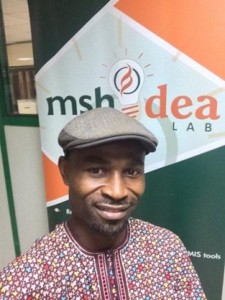
Benjamin Akinmoyeje, MSH IdeaLab, Nigeria
I experienced creativity, practicality and collaboration at the conference. We saw challenges and we talked about practical steps without criticism.
In my opinion, Social innovation is when a group of people decide to address the challenges in their community with available resources and expertise, in order to achieve an improvement for the common good of the community. A couple of examples of innovative ways to work with ICT and social change that have inspired me includes the way Ushahidi platform was used to monitor the 2015 Nigerian election and the Ebola Response. They were localised, the resources required to use them were easily available and the target communities could easily get support and own the process as well.
As an ICTD enthusiast who works in the public health space, I have found handy the ability to use open source software tools to collect data in order to help hard to reach communities make informed decisions. In this way, local community health administrators are able to manage limited resources while quickly identifying areas most in need. The ability to use open source tools like DHIS 2.0, Commcare, OpenDataKit, MedicMobile, OpenMRS , GoogleMap, to gather data (sometimes real-time or otherwise), equips the health care providers, health facility managers /administrators and communities to improve their overall well-being.
For instance, I participated in a program to counsel out of school youths to adopt safe sexual health practices. There was a need to collect data of how many people were reached and the level of adoption. For this purpose we used DHI 2.0 over mobile phones, which allowed local government officials get timely data in order to be able to adjust their intervention, despite their location. The volunteers were from the target community, the mobile phones were easily available and the resource required to support it was cheap airtime sold in that area. As the end result, the program was valued by the community and the youths became more responsible in their sexual health behaviour. The ownership of the program was evidence when the district chief donated about 800 dollars to see to the continuity of the program.
Another example is the “Stop. Don’t drop.” campaign. The organiser mobilises young professionals through social networks like Facebook and WhatsApp groups, to do community clean-up activities in the slums or to refurbish community school’s playgrounds with recycled waste materials like old tires, empty plastic bottles, etc. This campaign targets the awareness of waste disposal, its effect on climate change and the need to create a positive attitude towards preserving our environment. The ownership of the program was evidence when the district chief donated about 800 dollars to see to the continuity of the program.
My expectations for the ICT4 Social Innovation Conference were to discover genuine and practical social innovations in Africa and the new trends regarding health care issues. I wanted to interact with the social innovators, to understand their methods and approaches, in order to seek opportunities to develop new health care ICT projects.
During the two days of the conference I experienced creativity, practicality and collaboration. We saw challenges and we talked about practical steps without criticism. I was able to leverage other people’s knowledge and I brought my own professional experience. I met people and we were able to create a solution with our different skills and abilities. I’ve been trying to get attention for my projects for years and suddenly there were people interested in what I do.
We were able to do something together that we could pitch in only two days!! We were networking within Africa in two days. It’s huge! And we launched a network that will live on.
You can follow MSH IdeaLab Nigeria on FaceBook and Twitter. https://twitter.com/mshngidealab https://www.facebook.com/mshnigeriaidealab/

